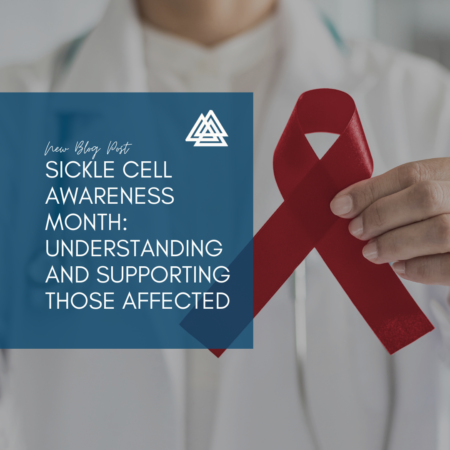 September is Sickle Cell Awareness Month, a time dedicated to increasing awareness about sickle cell disease (SCD) and supporting those affected by this serious genetic condition. Sickle cell disease impacts millions of people worldwide, particularly in communities of African, Mediterranean, Middle Eastern, and Indian descent. Understanding the challenges of SCD and the importance of early diagnosis and treatment can make a significant difference in the lives of those affected.
September is Sickle Cell Awareness Month, a time dedicated to increasing awareness about sickle cell disease (SCD) and supporting those affected by this serious genetic condition. Sickle cell disease impacts millions of people worldwide, particularly in communities of African, Mediterranean, Middle Eastern, and Indian descent. Understanding the challenges of SCD and the importance of early diagnosis and treatment can make a significant difference in the lives of those affected.
What is Sickle Cell Disease?
Sickle cell disease is a group of inherited blood disorders characterized by the presence of abnormal hemoglobin, known as hemoglobin S. This abnormal hemoglobin causes red blood cells to become rigid, sticky, and crescent-shaped (like a sickle), rather than the normal, flexible, disc shape. These sickle-shaped cells can block blood flow in blood vessels, leading to painful episodes, known as sickle cell crises, and other serious complications.
Some of the key complications of SCD include:
- Painful Crises: Sickle cell crises are sudden episodes of severe pain caused by blocked blood flow. These episodes can occur in any part of the body and often require medical attention.
- Anemia: Sickle cells break down prematurely, leading to a shortage of healthy red blood cells (anemia). This can cause fatigue, weakness, and delayed growth in children.
- Infections: People with SCD are more vulnerable to infections due to damage to the spleen, an organ that helps fight infections.
- Stroke: Blocked blood flow to the brain can result in a stroke, a serious and potentially life-threatening complication of SCD.
- Organ Damage: Over time, the repeated blockage of blood flow can cause damage to organs such as the liver, kidneys, lungs, and heart.
Raising Awareness and Supporting Research
Sickle Cell Awareness Month is an opportunity to educate the public about SCD and advocate for better care and treatment options. Despite significant advancements in treatment, many individuals with SCD still face challenges in accessing adequate healthcare and managing their condition.
Research is critical in improving the lives of those with SCD. Ongoing studies are focused on developing new treatments, such as gene therapy, that could offer a potential cure for the disease. The Sickle Cell Disease Association of America (SCDAA) emphasizes the importance of supporting research efforts: “Continued research and clinical trials are vital to finding a cure and improving the quality of life for those living with sickle cell disease.”
How You Can Help
There are several ways to support individuals with SCD and contribute to the fight against the disease:
- Educate Yourself and Others: Learn more about SCD and share information with your community. Raising awareness helps reduce stigma and promotes understanding of the challenges faced by those with the disease.
- Donate Blood: People with SCD often require blood transfusions as part of their treatment. Donating blood is a simple way to make a significant impact on the lives of those with SCD.
- Support Research: Consider donating to organizations that fund SCD research. Your contributions can help advance treatments and move closer to a cure.
- Advocate for Better Healthcare: Encourage policymakers to prioritize funding for SCD research and ensure that individuals with the disease have access to the care and support they need.
- Join or Support Support Groups: Support groups offer a sense of community and shared experiences for individuals and families affected by SCD. Participating in or supporting these groups can provide valuable resources and emotional support.
Sickle Cell Awareness Month is a time to come together to support those affected by this challenging condition. By raising awareness, supporting research, and advocating for better healthcare, we can make a meaningful difference in the lives of individuals with SCD. Whether through education, donation, or advocacy, every effort counts in the fight against sickle cell disease. Together, we can work towards a future where SCD is better understood, better managed, and, ultimately, cured.
